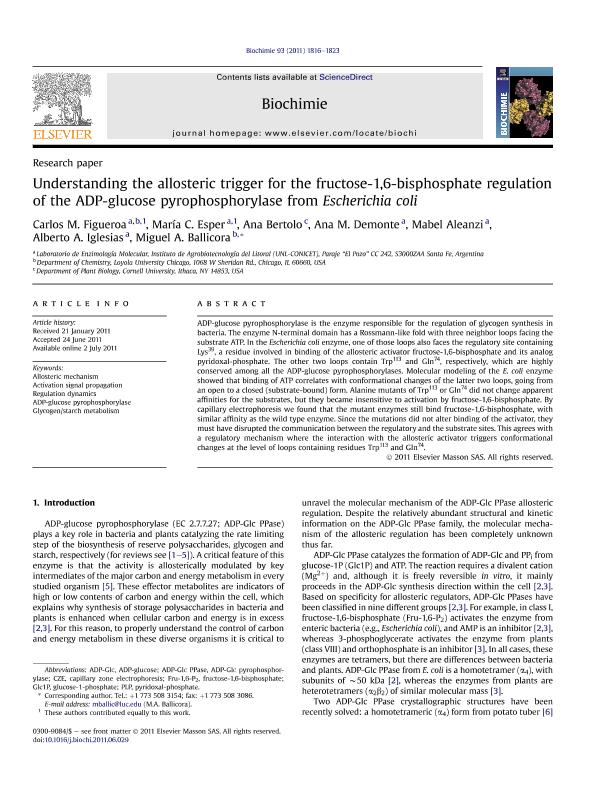Artículo
Understanding the allosteric trigger for the fructose-1,6-bisphosphate regulation of the ADP-glucose pyrophosphorylase from Escherichia coli
Figueroa, Carlos Maria ; Esper, María Cecilia; Bertolo, Ana; Demonte, Ana María Magdalena; Aleanzi, Mabel Cristina; Iglesias, Alberto Alvaro
; Esper, María Cecilia; Bertolo, Ana; Demonte, Ana María Magdalena; Aleanzi, Mabel Cristina; Iglesias, Alberto Alvaro ; Ballicora, Miguel A.
; Ballicora, Miguel A.
 ; Esper, María Cecilia; Bertolo, Ana; Demonte, Ana María Magdalena; Aleanzi, Mabel Cristina; Iglesias, Alberto Alvaro
; Esper, María Cecilia; Bertolo, Ana; Demonte, Ana María Magdalena; Aleanzi, Mabel Cristina; Iglesias, Alberto Alvaro ; Ballicora, Miguel A.
; Ballicora, Miguel A.
Fecha de publicación:
10/2011
Editorial:
Elsevier France-editions Scientifiques Medicales Elsevier
Revista:
Biochimie
ISSN:
0300-9084
Idioma:
Inglés
Tipo de recurso:
Artículo publicado
Clasificación temática:
Resumen
ADP-glucose pyrophosphorylase is the enzyme responsible for the regulation of glycogen synthesis in bacteria. The enzyme N-terminal domain has a Rossmann-like fold with three neighbor loops facing the substrate ATP. In the Escherichia coli enzyme, one of those loops also faces the regulatory site containing Lys 39, a residue involved in binding of the allosteric activator fructose-1,6-bisphosphate and its analog pyridoxal-phosphate. The other two loops contain Trp 113 and Gln 74, respectively, which are highly conserved among all the ADP-glucose pyrophosphorylases. Molecular modeling of the E. coli enzyme showed that binding of ATP correlates with conformational changes of the latter two loops, going from an open to a closed (substrate-bound) form. Alanine mutants of Trp 113 or Gln 74 did not change apparent affinities for the substrates, but they became insensitive to activation by fructose-1,6-bisphosphate. By capillary electrophoresis we found that the mutant enzymes still bind fructose-1,6- bisphosphate, with similar affinity as the wild type enzyme. Since the mutations did not alter binding of the activator, they must have disrupted the communication between the regulatory and the substrate sites. This agrees with a regulatory mechanism where the interaction with the allosteric activator triggers conformational changes at the level of loops containing residues Trp 113 and Gln 74.
Archivos asociados
Licencia
Identificadores
Colecciones
Articulos(IAL)
Articulos de INSTITUTO DE AGROBIOTECNOLOGIA DEL LITORAL
Articulos de INSTITUTO DE AGROBIOTECNOLOGIA DEL LITORAL
Citación
Figueroa, Carlos Maria; Esper, María Cecilia; Bertolo, Ana; Demonte, Ana María Magdalena; Aleanzi, Mabel Cristina; et al.; Understanding the allosteric trigger for the fructose-1,6-bisphosphate regulation of the ADP-glucose pyrophosphorylase from Escherichia coli; Elsevier France-editions Scientifiques Medicales Elsevier; Biochimie; 93; 10; 10-2011; 1816-1823
Compartir
Altmétricas



